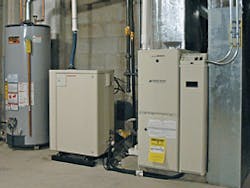Heating System Generates Free Electricity
Every engine produces some amount of heat; however, it's typically an unwanted and unused byproduct of a machine designed for some other purpose, such as making an automobile go, making an assembly line operate, or generating electricity. But the engine used in the Micro CHP system made by Medfield, Mass.-based Climate Energy is designed to make good use of the excess heat it produces. In fact, heating the home is its primary purpose — the electricity it generates is just an added bonus. “You only run the system to produce the heat, and then while you're using that energy you basically get two for one,” explains Climate Energy CEO Eric C. Guyer. “Big power plants have to throw away most of the energy, and the fuel gets dissipated as waste heat. So it's much better if you generate the power on-site.”
While combined heat and power (CHP) systems have been around for a number of years, they were historically designed for use in non-residential and industrial buildings. But in 2000, a team of experienced home heating professionals joined forces to create Climate Energy in hopes of making a commercial product that offers CHP delivery in the home. A partnership with Honda turned the group's hope into reality. Providing the one-cylinder MCHP engine/generator unit for the Micro CHP, Honda's engine produces 11,000 Btus per hour of heat in the form of hot water, which is used to heat the dwelling, in addition to 1.2kW of electric power for the home. According to Guyer, the unit could possibly generate as much as 4,000 to 5,000 kilowatt-hours per year — about half of the electricity used by the average U.S. household. “The technological requirements are a lot different than those for normal home generators, which are just like standby or back-up generators,” Guyer says. “This is equipment that has to run tens of thousands of hours and be very reliable, quiet, and durable.”
The Micro CHP's engine is fueled by the home's natural gas line, and the electricity it creates is fed into the home's electrical system. Installed much like a typical home heating unit, the product is designed to plug into a 240V outlet. Once the Honda engine generates electricity, the heat byproduct is collected via a cogeneration heat exchanger module and then transferred into the space heating system, also connected directly to the natural gas line. If the heat generated by the engine isn't sufficient on particularly frigid days, the system's high-efficiency auxiliary burners will turn on to provide supplemental heat. On the other hand, if the electricity generated is more than the individual uses, it will simply flow back into the electric utility's power distribution system. “It flows out back through the meter to the utility system and actually spins the meter backward,” Guyer explains. “Basically you get full credit for all the power that you produce with the system against your monthly electric bill.”
Beyond saving money on the electric bill, the CHP system also offers environmental benefits. Guyer claims the system provides about 80% of the environmental benefits of converting the home to solar electric photovoltaic cells, but at about 20% of the price. The Micro CHP is also designed to save the user time through its supervisory control system, which allows control through a digital wall thermostat or remotely via the Internet — where a Web page also displays the user's power and economic savings from using the system.
In addition to Internet capabilities, other technologies harnessed for this residential CHP include a catalytic converter, emissions control, and solid-state power inverter technology to provide proper levels of clean, synchronized AC power to the grid. “The system's very much like a hybrid automobile in that there's no new fuel cell or anything really exotic in the hybrid automobile,” Guyer says.
Bernard Malin, a general contractor residing in Braintree, Mass., was one of the first users of the Micro CHP system. He is very pleased with the constant, even heat the system provides and is also impressed by the unit's size and limited noise. “It's really small,” he says. “The generator looks like a processor for a computer, and it's quiet when it's running — you could virtually have it in the next room, and you wouldn't wake up with it.”
Malin expects units like this to soon become standard, lessening the need for new power plants. “That's what they're looking at down the road,” he says. “We'll basically have all these little systems in people's houses, and any extra electricity they're producing will go back on the grid.”
For now, the unit is sold only in Massachusetts as part of a slow, controlled product introduction to allow the company to work out any kinks early on. Its current price tag is about $12,000 — more than double the price of a typical high-efficiency heating unit. “But depending on the location and the tariff and regulatory situation, paybacks could be anywhere from just a couple years to maybe five years or so,” says Guyer, who plans on introducing the Micro CHP in other New England states over the next year or two.
For more information, visit www.climate-energy.com.
